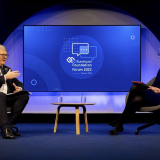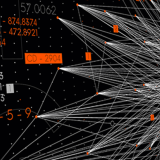EU context
Beleidsmakers moeten kennis vergaren die hen helpt vraagstukken op te lossen met betrekking tot doeltreffende regelgeving, die sociale bescherming in brede zin waarborgt en de behoeften van het bedrijfsleven, de samenleving en het individu in evenwicht brengt bij de benutting van het enorme potentieel van digitalisering.
De Europese Commissie heeft in 2015 haar strategie voor de digitale eengemaakte markt voor Europa aangenomen en als een van haar beleidsprioriteiten aangemerkt. De strategie kan digitale kansen voor burgers en bedrijven creëren en heeft tot doel de positie van de EU als wereldleider in de digitale economie te versterken. Zij is erop gericht de toegang tot informatie te verbeteren, banen beschikbaar te maken voor mensen met de juiste digitale vaardigheden en overheidsdiensten te veranderen. In het licht van de uitbreiding van de deeleconomie in de hele EU wil de Commissie de ontwikkeling van nieuwe en innovatieve diensten aanmoedigen en tegelijkertijd adequate beschermingsmaatregelen treffen. De mededeling van de Commissie uit 2016 over de Europese agenda voor de deeleconomie verduidelijkt de regels en beleidsadviezen op dit terrein voor burgers, het bedrijfsleven en de lidstaten.
Het werk van Eurofound
Eurofound bestudeert de algemene gevolgen op het gebied van onder andere arbeidsomstandigheden en arbeidswetgeving van de digitale technologieën die sterk aan belang en reikwijdte op de arbeidsmarkt toenemen.
Zij onderzoekt wat de gevolgen van baanbrekende technologieën in de dienstensector zijn voor de werkgelegenheid. Eurofound doet ook onderzoek naar de gevolgen van de platformeconomie, en met name platformwerk, voor de arbeidsmarkt. Verder wordt het onderzoek naar de arbeidsomstandigheden en werkgelegenheid van door ICT mobiele werknemers voortgezet.
Er zal onderzoek worden gedaan naar de aard van werk en werkgelegenheid in het digitale tijdperk, met bijzondere aandacht voor:
Belangrijkste bijdragen
In een gezamenlijk verslag van Eurofound en de Internationale Arbeidsorganisatie (IAO) over altijd en overal werken wordt ingegaan op het effect van telewerken en door ICT mobiel werk op bepaalde elementen van arbeidsomstandigheden.
De Foundation Seminar Series (FSS) van Eurofound biedt overheden, vakbonden en werkgevers de gelegenheid de ontwikkeling van sociaal, werkgelegenheids- en arbeidsgerelateerd beleid van de EU te bespreken. In 2016 was de FSS gericht op het effect van digitalisering op werk en op het ontwerp van nationale agenda's voor betere uitvoering van digitale veranderingen.



































